In The News
Hearing Health and Aging: What Gary Cote Wants You to Know
Audiologist Gary Cote explains the importance for individuals to proactively monitor their hearing and the potential impact this will have on their health as they age. He highlights findings from the Johns Hopkins study of adults who were followed from their mid-60s into their 90s, which demonstrated the importance of regular evaluations for hearing care providers to detect changes in hearing as it continues to decline. You can access the video from Gary Cote to learn more about how to maintain your hearing health through regular hearing evaluations.
Carrie Sousa Discusses the Hearing Loss–Dementia Connection with NBC Bay Area
A recent study has pointed to a possible link between hearing loss and dementia risk, and Carrie Sousa explains the implications. She discusses how untreated hearing loss may put added stress on the brain, and how this affects memory and cognitive processing, and how withdrawal from social situations due to hearing suffers can also contribute to decline. Carrie emphasizes that even mild hearing changes should be addressed – early screening and the appropriate use of hearing instruments are necessary to help keep the brain healthy and to ultimately maintain quality of life.
Leonard Kramer on Hearing Loss Warning Signs
Hearing Care Practitioner Leonard Kramer outlines the initial indicators of hearing loss, what the research indicates regarding Dementia and Alzheimer’s Disease, and suggestions you can implement to assist in maintaining long-term cognitive well-being. He states the critical things to consider before seeking treatment for hearing loss are the frequency of repeating phrases heard from others and difficulty having respectful conversations with others around you. Most importantly, he states: “The earlier you begin testing for hearing impairments, the better your chances of successful advancement.” At Beltone University Place, hearing care providers offer complimentary testing for hearing problems along with personalized education regarding how hearing devices can enhance the overall health of your brain. Although using hearing devices will not heal your hearing impairment, as well as dementia, they do help to greatly decrease the severity and magnitude of your problem as it continues.
Elaine Backman on the Strong Link Between Hearing Loss and Dementia with Fox 5
A recent study reveals a surprising relationship between dementia and hearing loss, and Elaine Backman shares what that means for everyday health. She explains how untreated hearing loss requires the brain to work harder at interpreting sounds—taking mental energy away from processing memory and thinking, possibly accelerating cognitive decline. Elaine reinforces that even mild hearing loss should be taken seriously, and shares how hearing aids can reduce social isolation, ease engagement with your surroundings, and prevent mental decline when intervening early. These findings point to the importance of regular hearing assessments, treating hearing loss, and gaining helpful housing information as part of preserving brain health.
Can Hearing Health Protect Your Brain? Insights from James Blaszkowski with Fox 31 Denver
A newly published study contributes to the growing evidence that hearing loss may increase the risk of dementia, and in this video, James Blaszkowski offers expert opinion. He explains the biological and social factors that may be linked to the connection: increased cognitive load, neurobiological changes, and social isolation resulting from hearing loss. James articulates why timely screening, diagnosis, and appropriate intervention for hearing loss are important to help reduce long-term cognitive decline. Tune in to learn why caring for your hearing is not just about hearing but caring for your brain, too.
Ashley Teti, Washington Post-Gazette
According to a new study, It is possible that 32% of dementia cases in older adults may be attributable to hearing loss. Hearing & Balance Center of Pittsburgh, which provides hearing care, mentions that “having untreated hearing loss requires the brain to work overtime, to be less socially engaged, and may speed up their cognitive decline.” The provider recommends early hearing testing and intervention to protect both hearing and brain health.
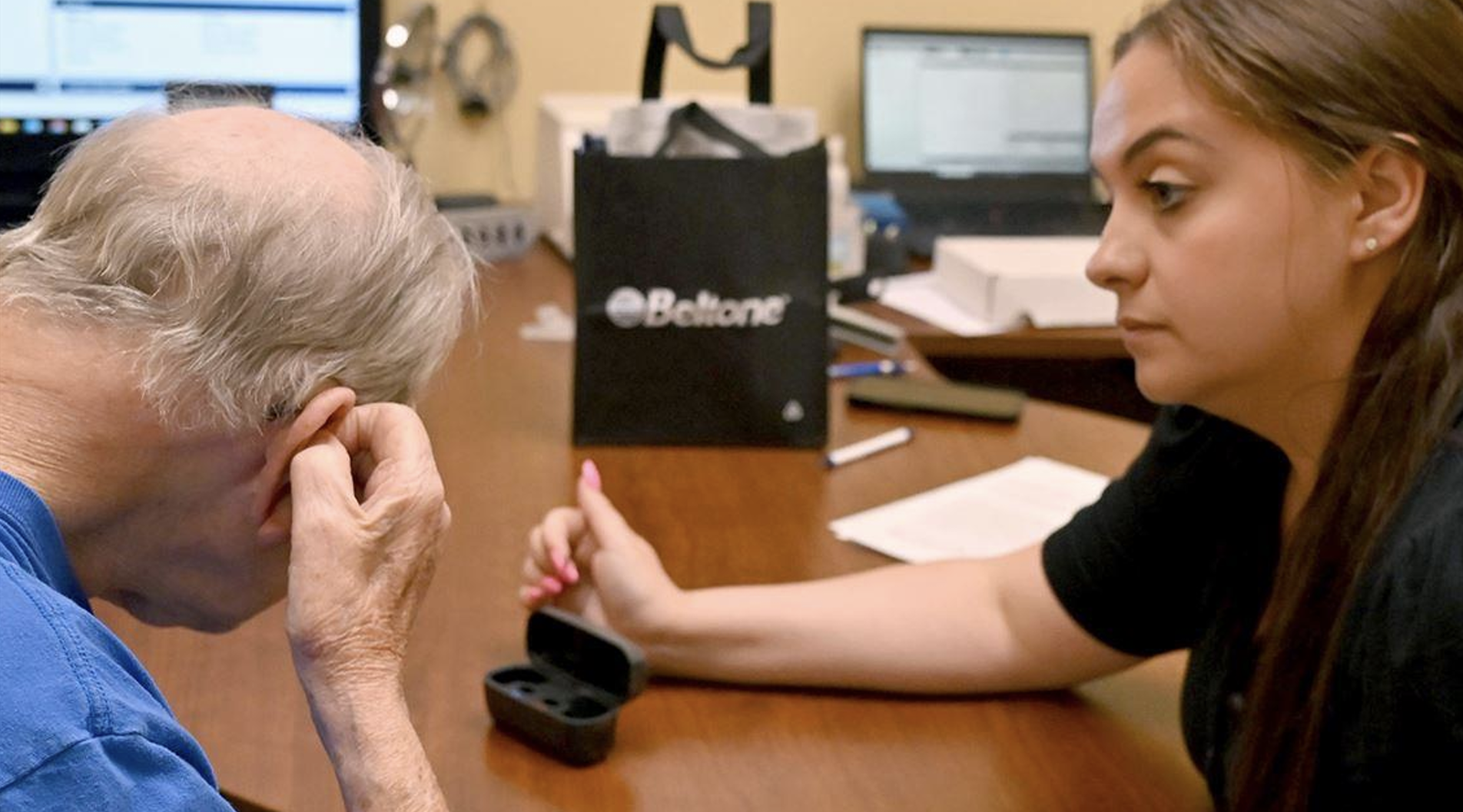
Amber Gillespie, Beltone Fairmont with Times West Virginian:
An article in the Times West Virginian has written on a recent study showing that hearing aids can significant decrease dementia risk in people with hearing loss. The findings imply that addressing hearing loss early contributes to reducing cognitive load and social withdrawal, which are both associated with dementia, suggesting that hearing-aid use is a useful public health strategy for brain health.
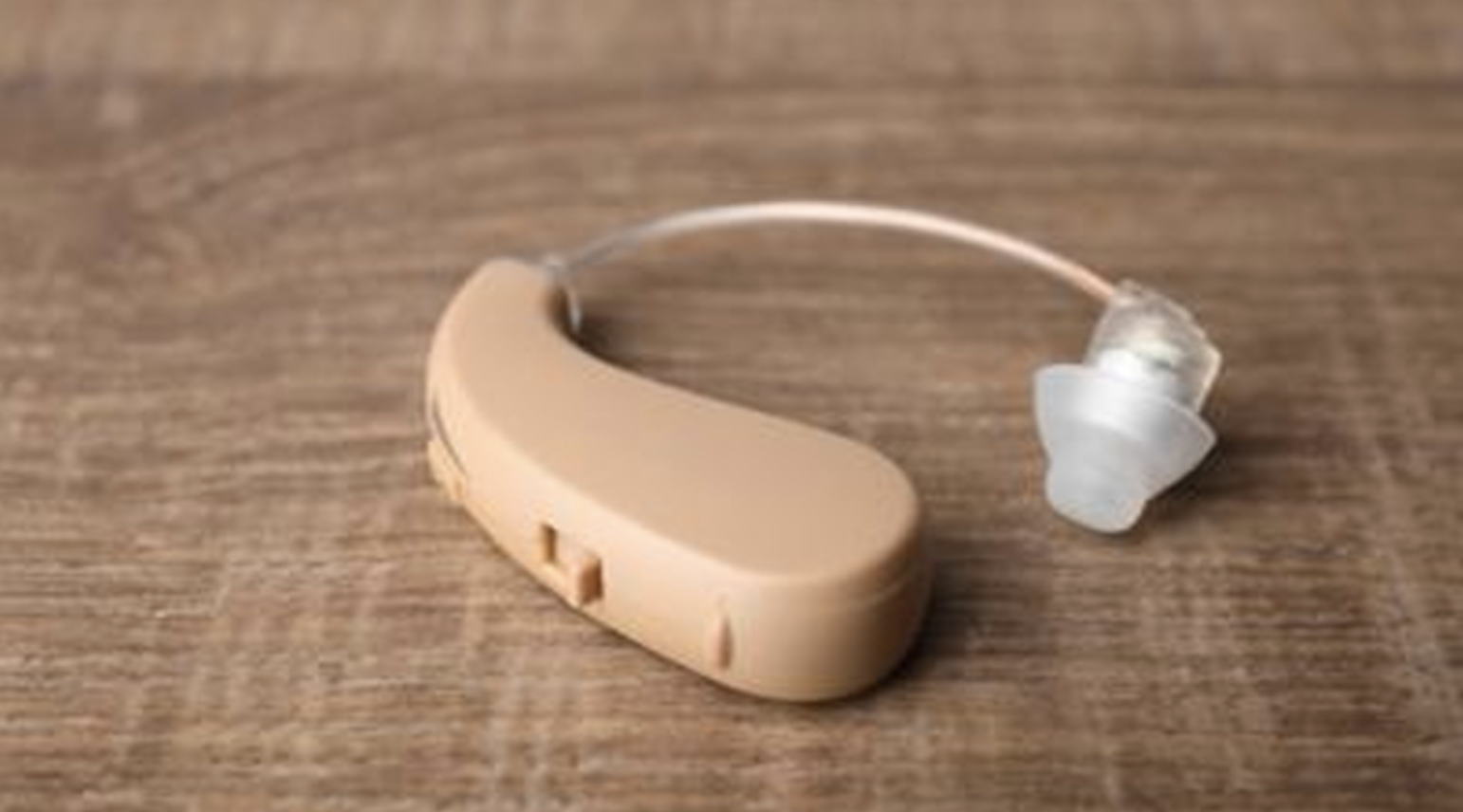
Jaime Silva “Neglecting hearing issues can cause problems”
Hearing care specialist Jaime Silva states that individuals with untreated hearing loss are at risk for social isolation, depression, and greater incidence of dementia. Many people put off seeking care for years because of stigma, and in the meantime their hearing, and general health, gets worse. One-third of dementia cases are related to hearing loss, research indicates. Silva encourages adults over age 50 to receive a hearing test every few years, and to seek early treatment with hearing aids when hearing loss is diagnosed for the protection of their hearing and cognitive health.
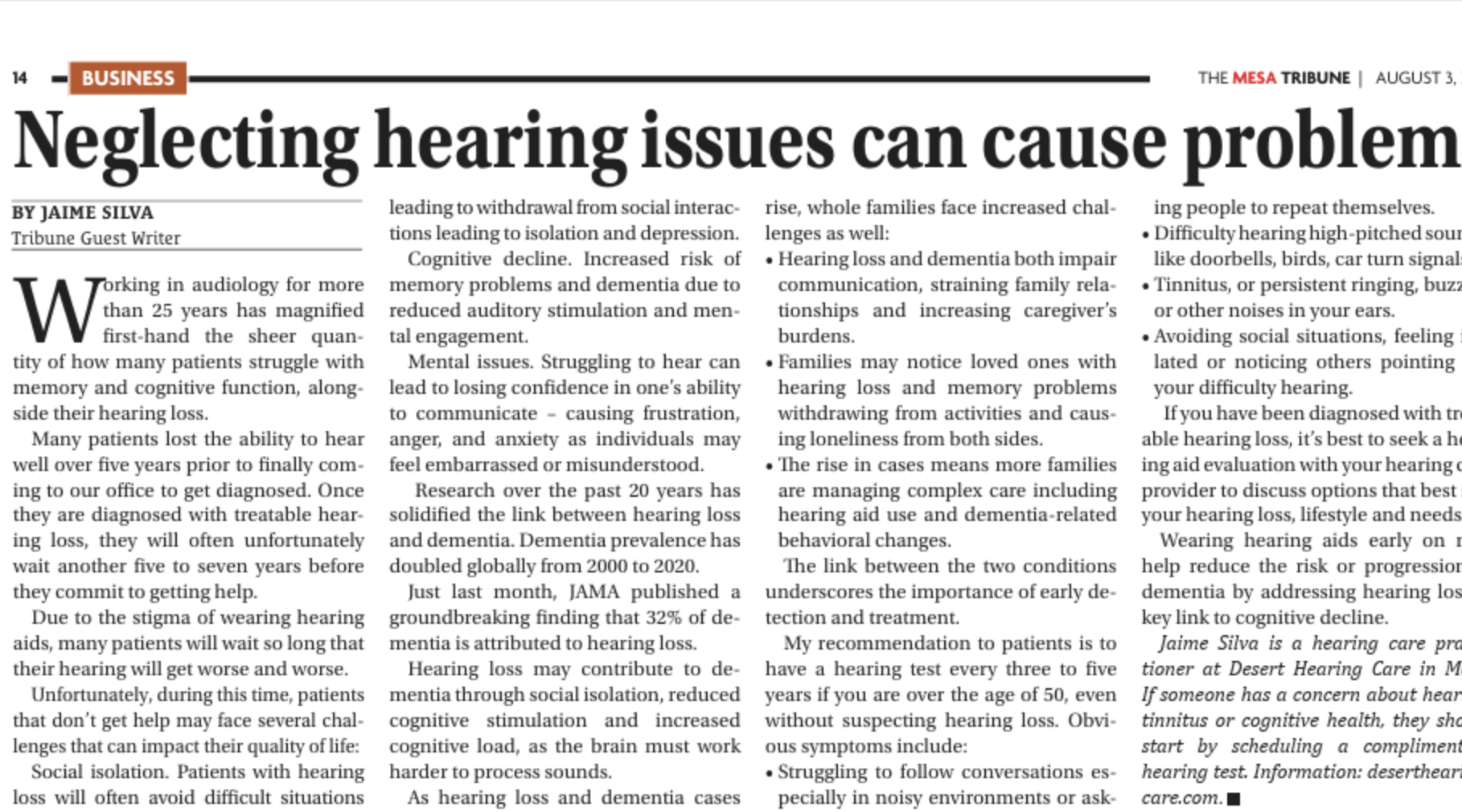
Karen Beyer: Reconnect with your world
Karen Beyer, a hearing care professional, discusses how hearing loss that isn’t treated can often lead to social isolation and they even have found a direct relationship with dementia. Individuals often withdraw from conversation or activity just because they cannot understand others. The person struggling may not communicate that they are having trouble hearing, instead will silently withdraw. However, once fit with hearing aids, individuals regain confidence, reengage in leisure activities, and restore social relationships. Modern hearing aids are very sophisticated and help people stay connected and mentally engaged by automatically adjusting to the surrounding environment. Beyer encourages everyone to have regular hearing tests so they can preserve their hearing and health of their brains.
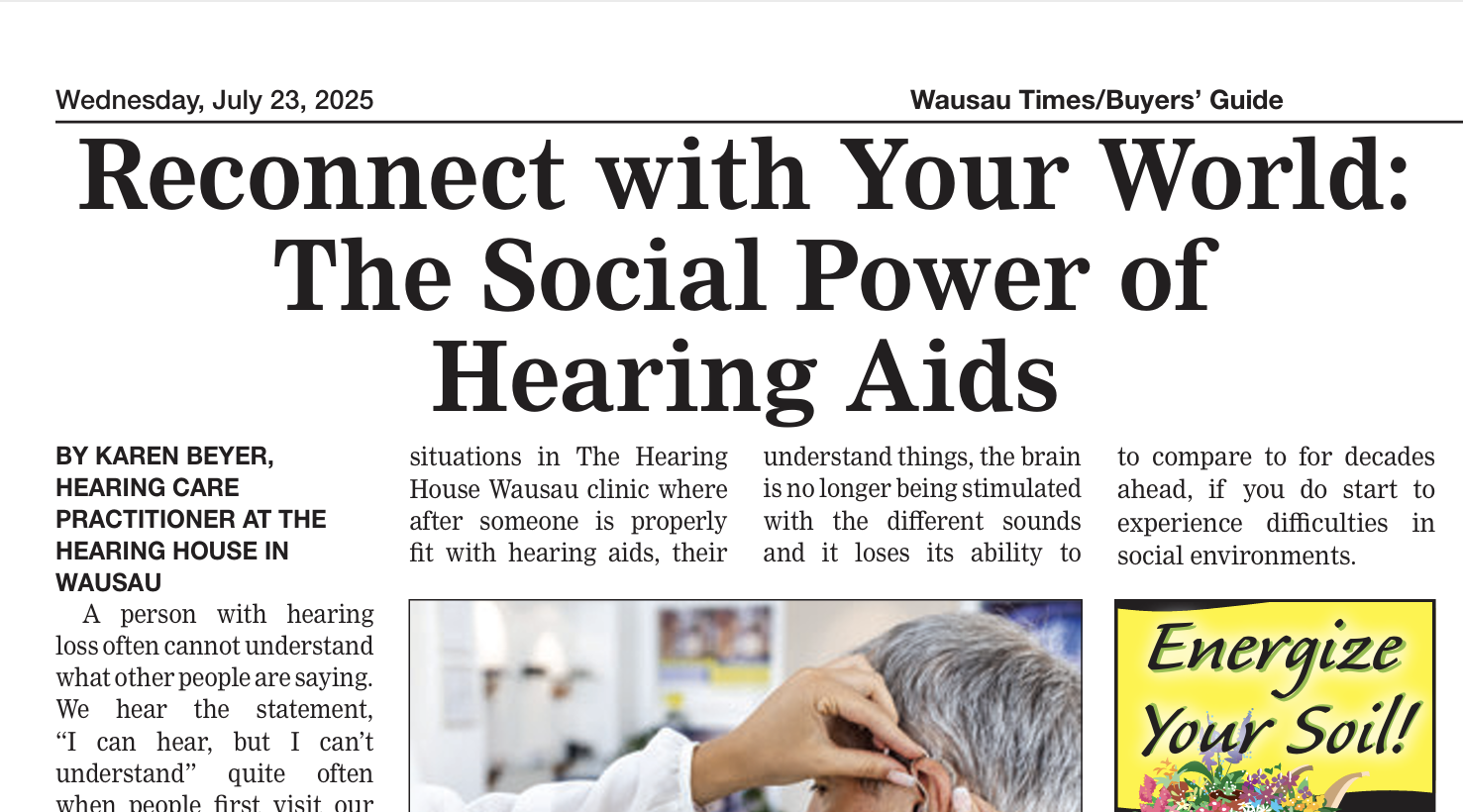
JoBeth Finnegan, WMFD
Summary: A hearing-aid specialist from Hearing Specialists of Ashland in Ashland, speaking to WMFD, spoke about the strain untreated hearing loss puts on the brain and how it can lead to social isolation — both of which are very significant risk factors for Dementia. The hearing-aid specialist urged people to get their hearing tested early on and getting hearing aids is extremely beneficial to reduce cognitive load being placed on the brain and promote brain health & cognitive load and promote brain health & cognitive load and promote brain health.
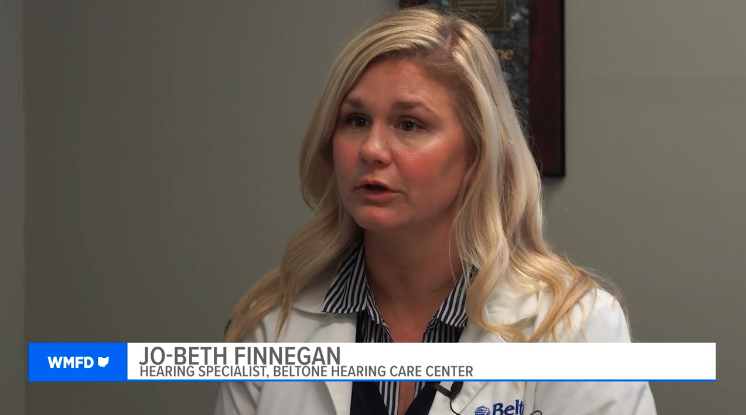
Jared Teter on the Link Between Hearing Health and Brain Health with KKTV 11
Research indicates that if hearing loss is treated, it may help delay the onset of dementia. Our own Jared Teter shares his thoughts on this important issue. In the video, Jared discusses how treating hearing loss — through hearing aids or other interventions, such as counseling — made earlier in life, can result in less cognitive load, and help maintain brain health over the long term. Jared discusses both memory loss and loneliness as two risk factors for earlier dementia, which are exacerbated by untreated hearing loss. There is considerable research on the impact of hearing health on cognitive health; thus, Jared stresses the importance of permanent hearing tests and intervention (when needed) to promote brain health and health in general.
Karen Beyer Talks About the Connection Between Hearing Loss and Dementia with ABC 9
New research suggests a strong relationship between hearing loss and dementia, and in this video, Karen Beyer, our in-house expert, will offer insights on what all of this might mean for you in practice. Karen explains how untreated hearing loss could increase the burden on the brain, and therefore potentially increase the risk of dementia, and that using hearing aids might help reduce this burden if they are used on time. With her extensive knowledge and experience in hearing care, Karen insists on the importance of screening and early intervention— a simple message that connects the science and protects people’s cognitive health by taking action.
Jared Teter on the Link Between Hearing Health and Brain Health with Denver 7 ABC
Dr. Jared Teter of Beltone Hearing was featured on Denver 7’s Mile High Living to discuss the growing situation of hearing loss and how crucial it is for individuals to become screened for hearing loss. He discussed how listening to him and getting a screening early can significantly impact one’s ability to have a good quality of life and overall hearing health.
